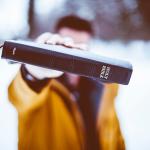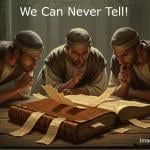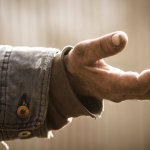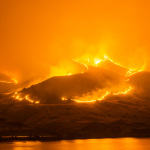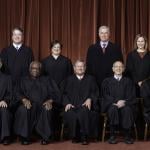Earlier today, a friend (who was actually there) commented that the events of 9/11 set off a chain reaction that led to Trump’s election.
As I work on my sermon for this week, I can’t stop thinking about how true that observation is. Because my sermon is about fear. And fear, more than any other factor in our history or culture, wrought the chaos that is the 45th president of these United States.
Do you remember? I mean, all of the memes indicate that we do. Alongside the pictures of American Flags, flowers, and kneeling mourners flash those words: We will always remember. And I know we may remember where we were and what we were doing in those moments. But do you remember the days after? Yes, there was sadness; there was grief; there was gratitude for those who showed bravery… but mostly there was fear. Uncertainty and chaos and fear.
There was uncertainty about who did this, and how we let this happen. And as information unfolded, revealing that these attacks were carried out by a militant group of Islamic extremists, then suddenly anybody wearing a head covering looked like a villain. Folks who didn’t know any Muslims in real life assumed that all Muslims wanted to kill us. Some of our political leaders–out of equal parts ignorance and opportunism– leveraged that narrative for all it was worth.
To justify a costly war.
To bolster a false sense of patriotism.
To make us more afraid, so we would give more power to anyone who promised to protect us.
Meanwhile, things we’d always taken for granted were no longer true. Airports weren’t safe places. City streets and public transportation didn’t feel secure. Uncertainty crept in around the edges. We were a mess. We were kind of lost.
And into that void crept, not a single political leader, but a whole narrative of fear and mistrust of the ‘other.’ That mistrust was not limited to Muslims, but bled into public discourse surrounding everything from immigration to police violence against black people. Groups that have always been marginalized in this country suddenly found that prejudice against them was acceptable in polite company again. More of our politicians, religious leaders, and public figures started beating a drum of blind nationalism as the only way forward.
And y’all, people were scared. They bought it.
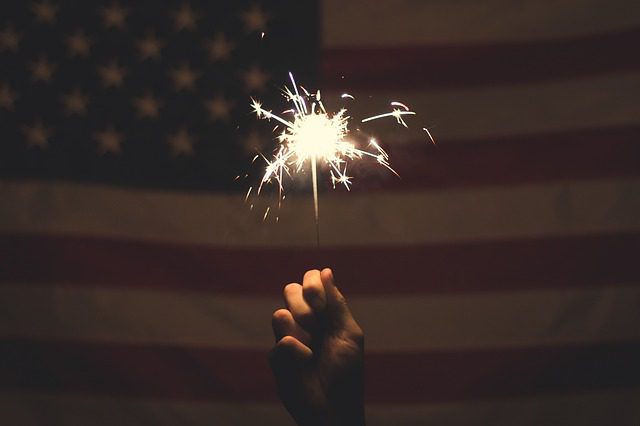
Over the next 15 years, while many Americans remained committed to a spirit of diversity, compassion and community, many more waded further into the murky waters of American exceptionalism. Into that void, where once was a sense of security and a shared national identity, crept increasingly conservative news outlets; the “alt-right;” and, you know, the lovely folks at Breitbart. From there it wasn’t a far leap to fake news, rampant conspiracy theories, and –let us not forget–a certain brand of white Christianity wherein the authority of scripture became hard to discern from the authority of the Republican Party.
Then some other stuff happened, and then Donald Trump got elected President. Because more than any of the other politicians that tried to artfully dance around and imply the same message, Trump came right out and said it–America First. Fear the brown people. Muslims are coming for us. Build a wall. Law and order. Make America Great.
And for a nation that had been living small and scared for so long, that sounded pretty great.
For what it’s worth, this is how fascist dictators are born. But of course, he was not the only politician to employ that message. Once he came right out and said those things, it emboldened the rhetoric of fear and mistrust from other corners. My own Congressman, Kevin Yoder sent out these really excellent mailings last fall:
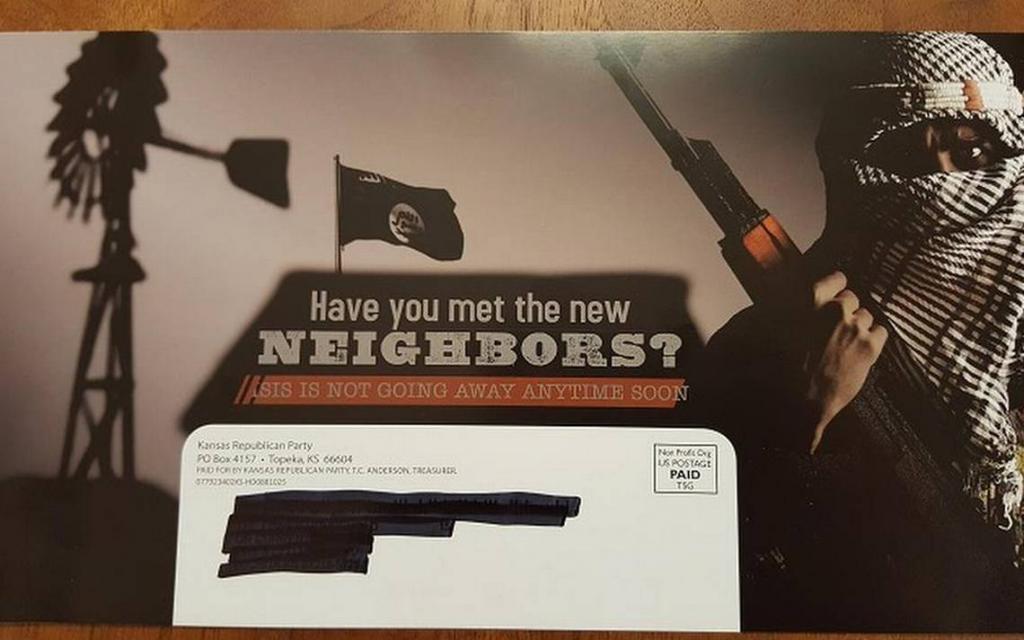
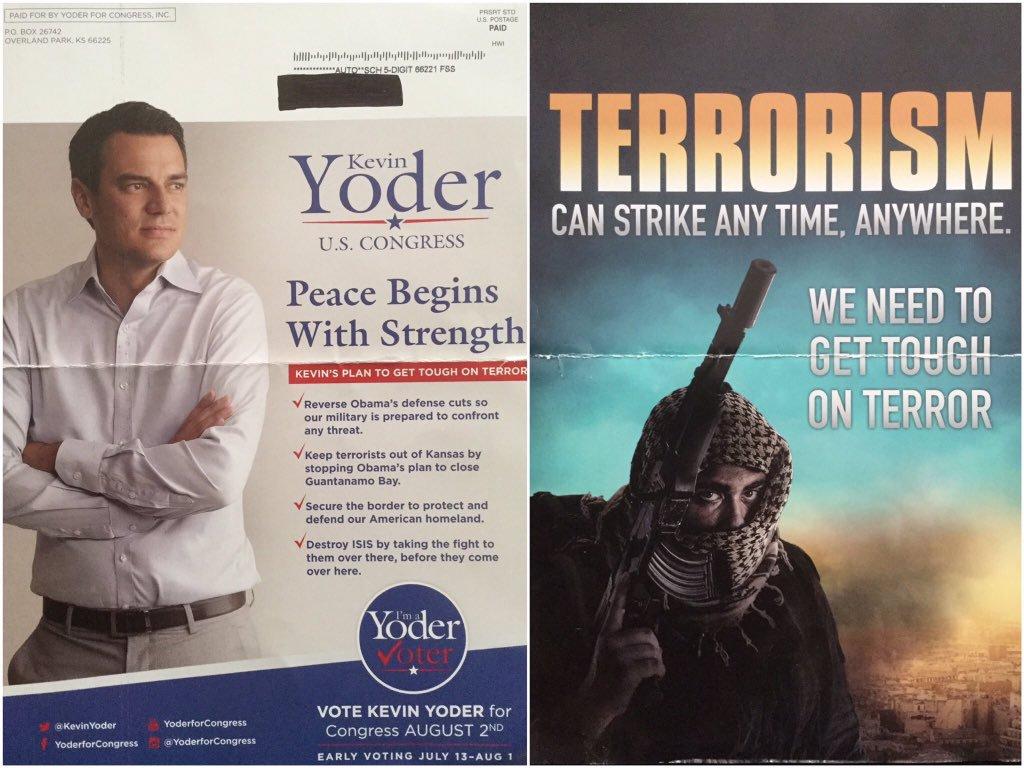
Jesus. Who are we?
Or rather…who do we want to be? That’s what I keep thinking today. Because while hate and fear were sure not born on a September day 16 years ago, those events sure unleashed some darker forces in our midst.
Through my work in congregational transformation, I’ve learned and thought a great deal about the forces that keep us small and scared; factors that drive our churches into irrelevance and prevent us from living the gospel we are called to embody. At a training event, many years ago, one of the leaders asked the group to think about where our congregations were, what struggles we faced, what it would take to turn things around, etc… And then he said:
“What would you do if you weren’t afraid?”
For me, that was the moment the lights came on. I was there with a group of leaders from my church, and we dove headfirst into answering that question together. And from right then, everything changed. Of course, that one question didn’t make it all happen. But it was the right question to move us forward, to empower us to let go of some petty concerns, and allow our vision to be bigger than the anxieties of the present moment.
For our country, September 11 had the opposite effect. That day asked us a lot of questions, and I hate to say, we came up with all the wrong answers. The day asked “What are you afraid of?” Dying! “Who are you afraid of?” Everyone! “Who do you trust?” Whoever is loudest and meanest! “What can you do to change it?” Nothing, we are helpless!
All the wrong answers.
I’m not saying there haven’t been some bright spots in our national story since then. But we have a President who clearly represents the very worst of us. Who, absurdly, obscenely, spoke in honor of victims and first responders at a memorial this morning, as the face and voice of the people… And I can’t help but grieve. Not only for the horrific event itself and the tragedy of lives lost; but for who we’ve become, and who we’ve chosen to lead us.
My deepest hope, my greatest prayer, is for leaders to step forward and ask us better, more life-giving questions. Like”What would you do if you weren’t afraid?” Or, maybe more to the point: “Who would you be if you weren’t afraid?”
For my money, I think we’d be a country that welcomes the stranger, embraces the immigrant, and shelters the refugee. That’s who we used to think we were, anyway. We’d be a land of opportunity, and place of religious freedom for all. We’d be less inwardly-focused, and a lot more benevolent with our many vast resources. Furthermore–we would value the land we live on, the land we claim is important to our story. And we would make a little more room for the questions that have no easy answers.
We could be many things, if we weren’t afraid.

